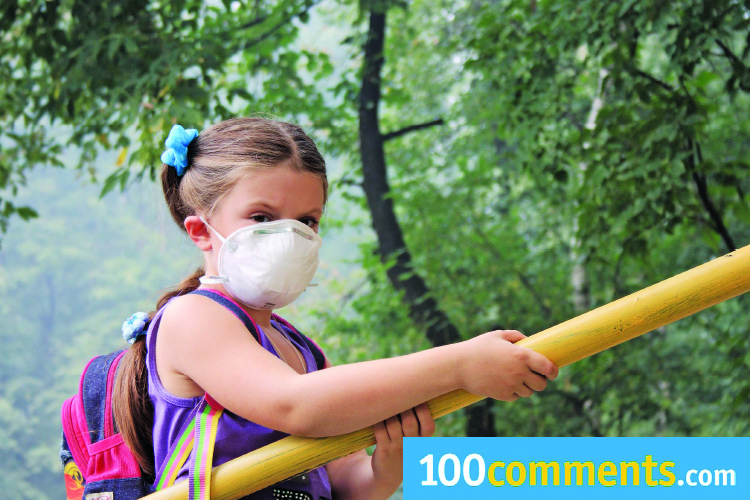A hazy skyline has become a regular occurrence in Malaysia but this time it seems to be back with a vengeance! Schools in many affected areas were called to be closed for some time in mid-September where else sales of surgical masks and other face masks for protection from the haze has also spiralled due to the demand for them these past few weeks.
Characterized by smoky, dirty air, the haze enveloping our air is caused by winds bringing in tiny particles of ash from the raging forest-clearing fires in neighbouring Sumatra, Indonesia. The condition seems to be worsening, putting countless people young and old at risk of respiratory, viral and bacterial infections. Is there anything to be done for the sake of our health and that of our loved ones?
Table of Contents
Health risks
Particles in the air brought about by the haze are called PM10 (10 refers to the size in microns of the particulate matters). Breathing in an excess of these particles can increase a person’s risk of various infections, as well as heart and lung diseases. They may even provoke cancer and stroke in high risk groups. While the bigger air particles are filtered out by the respiratory tract, tiny particles are typically deposited in the lungs. These tiny particles can accumulate over time and harm the body.
Haze is one of the most dangerous kinds of air pollutions of our time where existing health conditions such as eczema, asthma and even conjunctivitis are made worse by its presence. Even healthy people can suffer from irritation in the eyes, nose and throat, coughing and sneezing, especially if they spend time outdoors in the haze.
Protection from haze
There are always ways to protect yourself and your loved ones from the effects of a hazy environment. Here are some useful pointers:
- Stay indoors with closed doors as far as possible.
- Use an air-conditioner in your home whenever possible.
- Use an air ioniser or air purifier to catch very small particles.
- Drink more water than usual – this helps the kidneys flush out any toxins absorbed through the skin and lungs.
- Build up your immunity with foods rich in vitamin C (oranges, kiwi fruit, strawberries), vitamin E (nuts and seeds) and omega-3 fatty acids (oily fish).
- Use a good face mask to cover your nose and mouth when you are outdoors. Get your family members to do the same too.
Do face masks work to protect from the haze?
Yes, they do. Basically, you will need to filter out the air which you breathe when you’re outdoors in a hazy environment. Respirator masks (i.e. N95 or equivalent) are effective in filtering out the fine particles that are produced during haze episodes. Unfortunately though, plain ‘surgical’ mask are not designed to stop unhealthy particles in the air from entering your body through your nose or mouth. Hence, if you have a choice, do choose a respiratory mask over a surgical one.
Respirator masks, such as N95 masks, tend to filter out a large amount of very fine particles and have an airtight seal, hence they are more effective.- in protecting against the effects of the haze However, N95 masks work only if there is a good fit with the face of the wearer. This way, most of the air that the wearer breathes in has to go through the filter and not through the gaps between the mask and the wearer’s face. Haze can contain fine particles that are 2.5 microns or smaller (PM2.5), and studies have shown that N95 masks do provide good protection against particle pollutants as they are at least 95% efficient against fine particles that are about 0.1 – 0.3 microns.
These masks are necessary for individuals who are susceptible to the impact of haze, including persons with chronic medical conditions especially lung or heart disease, elderly, and pregnant women. Healthy persons who have to undertake prolonged and strenuous outdoor activity should also consider using a face mask when the air quality is poor.
When staying indoors is best
Respirator masks designed to fit onto the wearer’s face, hence, they are, unfortunately, not designed for use on children or people with facial hair (e.g. beards), because it is difficult to achieve a proper fit. Parents should therefore minimize their children’s outdoor activities at PSI levels above 100, and avoid all outdoor activity if 24-hour PSI levels reach higher than 300.
Pollution Standards Index (PSI) Readings
Experts have advised people with heart or respiratory diseases, as well as young children and elderly, to avoid being outdoors during hazy spells. Even if one does not have a pre-existing health condition, it is best to reduce all outdoor activities when the air quality is hazy and unhealthy.
As a guide, a PSI reading of 0-50 is considered good, 51-100 is moderate, 101-200 is unhealthy, 201-300 is very unhealthy and above 300 is hazardous.
















